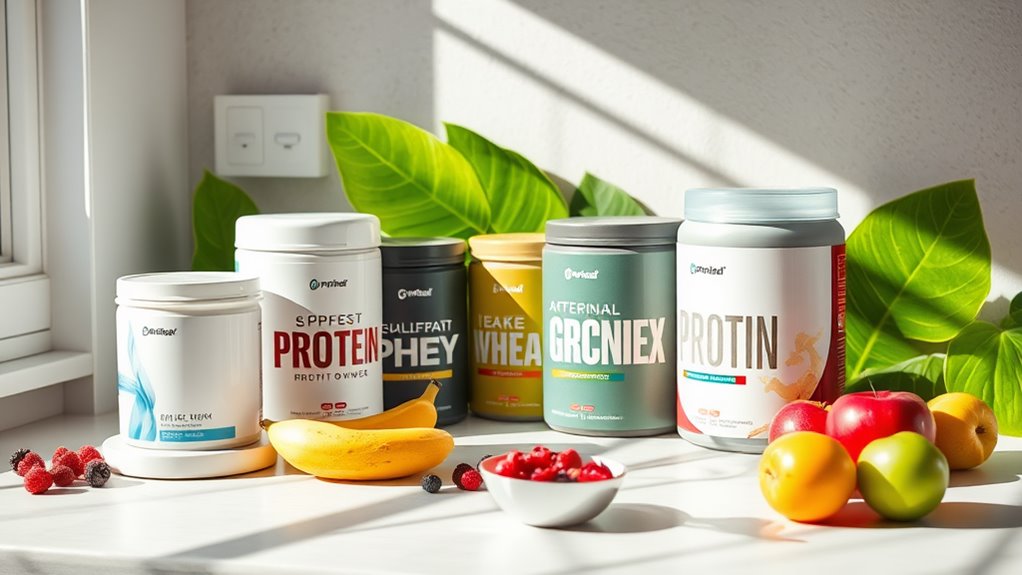To select the best protein powder for your weight loss goals, begin by evaluating the type of protein you require. Whey, casein, soy, and plant-based alternatives all provide distinct advantages. Take into account your dietary requirements and choose a powder with a solid protein-to-calorie ratio, preferably offering a minimum of 20 grams of protein per serving. Examine labels for additional sweeteners or preservatives and verify a clean ingredient list. Timing is also important; consume protein after exercising or prior to bedtime to suppress cravings. If you seek personalized assistance and advice, you'll discover valuable insights ahead.
Key Takeaways
- Assess your daily protein needs based on activity level and weight loss goals to choose an appropriate protein powder.
- Opt for protein powders with a high protein-to-calorie ratio to aid weight loss while meeting protein requirements.
- Look for clean ingredient lists, avoiding artificial sweeteners, fillers, and allergens that may disrupt digestion or health.
- Consider post-workout timing for protein intake to enhance recovery and curb cravings, especially with casein before sleep.
- Compare prices and serving sizes to ensure cost efficiency while shopping for protein powders, seeking bulk purchases for savings.
Understanding Protein Types
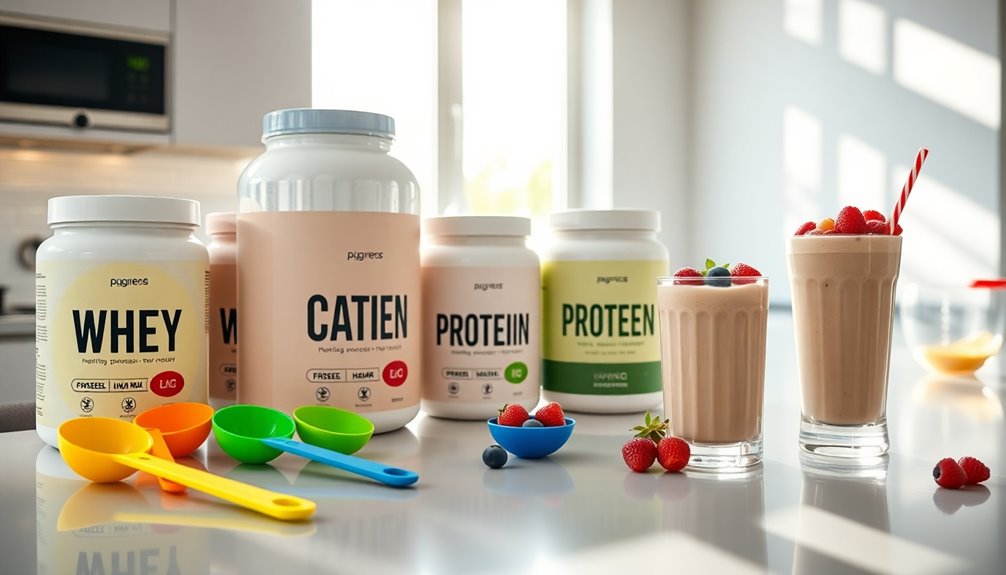
When you stroll down the supplement aisle, you'll notice a variety of protein powders, each designed to meet different needs. Understanding the types of protein and their unique characteristics is vital to making an informed choice.
The most common protein sources you'll encounter include whey, casein, soy, pea, and hemp. Whey protein, derived from milk, is a favorite for many due to its high digestibility rates and rapid absorption, making it ideal for post-workout recovery.
On the other hand, casein protein digests more slowly, providing a steady release of amino acids. This makes it a great option for nighttime use when your body can benefit from prolonged protein availability.
For those who prefer plant-based options, soy protein offers a complete amino acid profile, while pea protein is packed with iron and is easy on the stomach. A plant-based diet, rich in vital nutrients, can enhance overall health while supporting weight loss goals.
Digestibility rates are essential to take into account as they directly impact how effectively your body can utilize the protein. Higher digestibility rates mean better absorption and quicker muscle recovery.
It's worth noting that some individuals may have sensitivities to certain protein sources, like dairy or soy, so it's important to choose a powder that aligns with your dietary preferences and restrictions.
Ultimately, selecting the right protein powder isn't just about the type; it's about finding what works best for your lifestyle and goals. Embrace the journey of discovery, and you'll feel more confident in your choice.
Assessing Your Dietary Needs
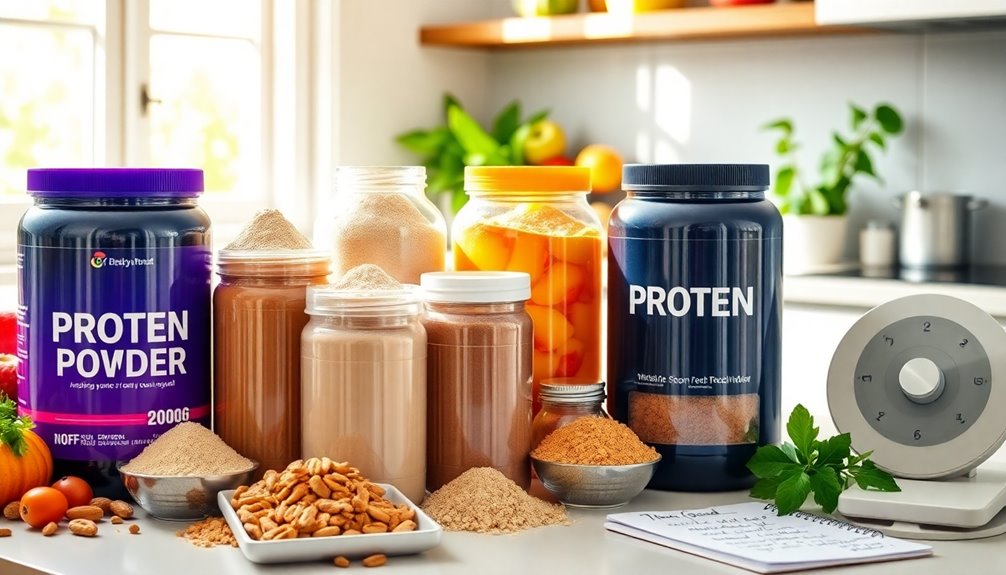
Evaluating your dietary needs is crucial before selecting a protein powder for weight loss. Understanding what your body necessitates will help you discover a product that complements your nutritional balance and supports your weight loss journey. Here are four key factors to ponder:
- Caloric Intake: Determine how many calories you need to consume for weight loss. A protein powder can be a convenient way to meet your protein goals without surpassing your calorie limit.
- Protein Requirements: Assess how much protein you should aim for daily. This can vary based on your activity level, age, and weight loss goals.
- Dietary Restrictions: Reflect on any allergies or dietary preferences you may have, like lactose intolerance or a vegan lifestyle. Your protein choice should align with these restrictions to make sure you can enjoy it without worry.
- Lifestyle Adjustments: Contemplate how your current lifestyle impacts your eating habits. If you're frequently on-the-go, you might prefer a powder that mixes easily and can be taken anywhere. Additionally, consider incorporating variety of delicious Keto recipes to keep your meals exciting and satisfying while you pursue your weight loss goals.
Evaluating Protein Quality
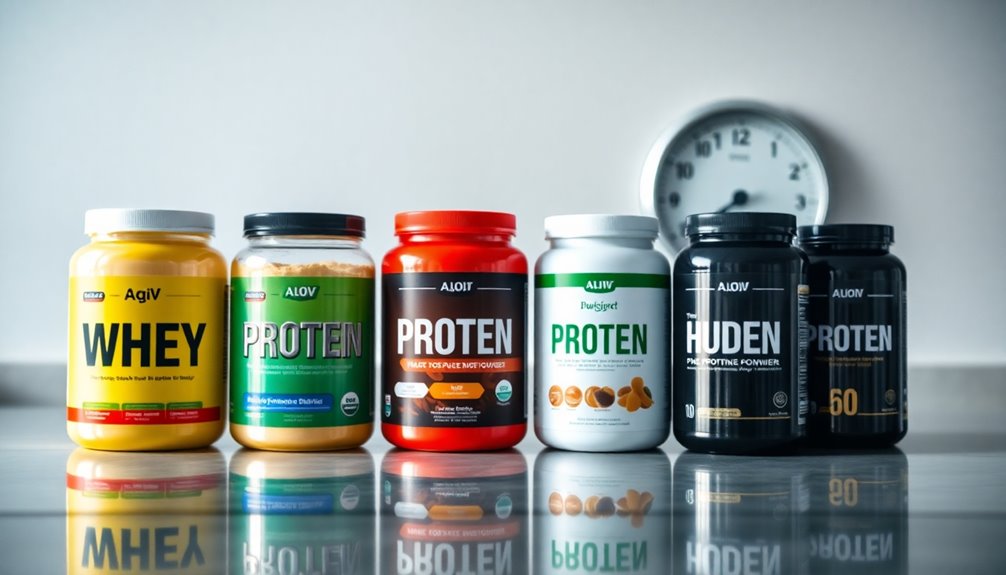
Choosing a protein powder for weight loss requires thoughtful evaluation of protein quality, as not all powders are made equal. When assessing protein sources, you'll want to focus on the amino acid profile. Amino acids are the building blocks of protein, and they play an essential role in muscle repair and growth, which is crucial for effective weight loss.
Look for protein powders that offer a complete amino acid profile, meaning they include all nine essential amino acids your body can't produce on its own. Whey protein, for example, is highly esteemed for its outstanding amino acid composition and rapid absorption rate.
If you prefer plant-based options, contemplate pea, rice, or hemp protein, which can provide a balanced amino acid profile when combined. Additionally, many people on a vegan diet require more protein, making it important to choose powders that opt for whole food sources over processed powders.
Another aspect to ponder is the protein's digestibility, often assessed by the Protein Digestibility-Corrected Amino Acid Score (PDCAAS). A higher score indicates better absorption and utilization by your body. For weight loss, selecting a protein powder with a high PDCAAS can boost your overall protein intake efficiency.
Lastly, don't overlook checking for additional ingredients that may affect quality. Powders with fewer additives and fillers are generally superior choices. By prioritizing protein quality, you guarantee that you're not only supporting your weight loss objectives but also nourishing your body with the necessary nutrients it requires to thrive.
Considering Caloric Content
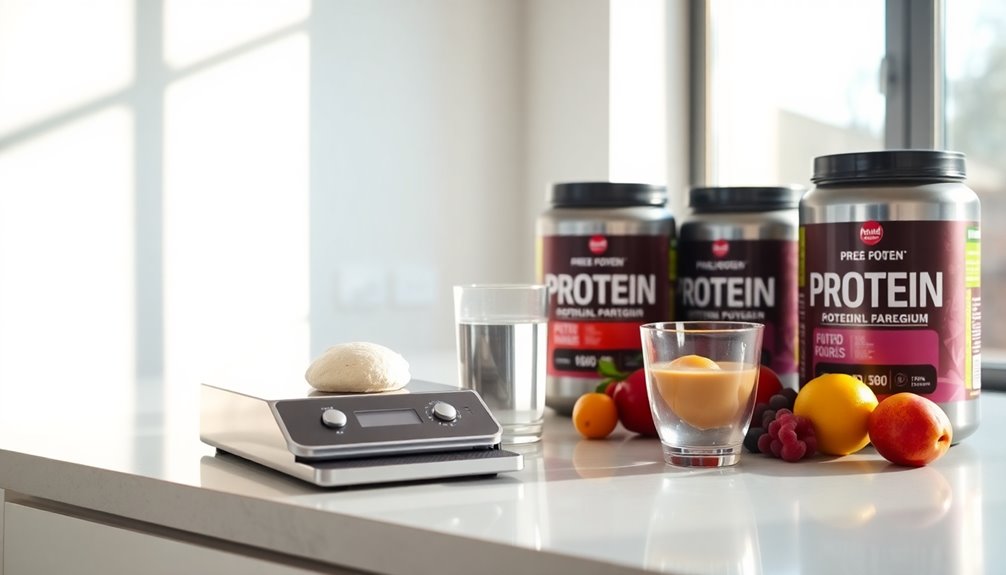
Reflecting on caloric content is crucial in your pursuit for effective weight loss through protein powder. Balancing your caloric intake is key to creating a caloric deficit, which is essential for shedding pounds while still supporting muscle growth. By choosing a protein powder with the right caloric content, you can enjoy the benefits without compromising your weight loss goals.
Here are four important factors to contemplate when evaluating the caloric content of protein powder:
- Caloric Density: Look for options that offer a good amount of protein relative to calories. This ensures you're receiving the nutritional value you need without excess calories.
- Serving Size: Be mindful of the serving size indicated on the label. Sometimes, what seems like a low-calorie option might require a larger serving to meet your protein needs.
- Dietary Goals: Ponder on your personal weight loss and muscle growth goals. If you're aiming for substantial muscle gain, a higher-calorie protein powder might be beneficial, while a lower-calorie option could suit those focused strictly on weight loss.
- Daily Caloric Needs: Calculate your daily caloric needs based on your activity level and goals. This will help you determine how much protein powder fits into your overall dietary plan. Additionally, consider incorporating progress tracking tools to help monitor your intake and adjust your diet as needed.
Checking for Added Ingredients
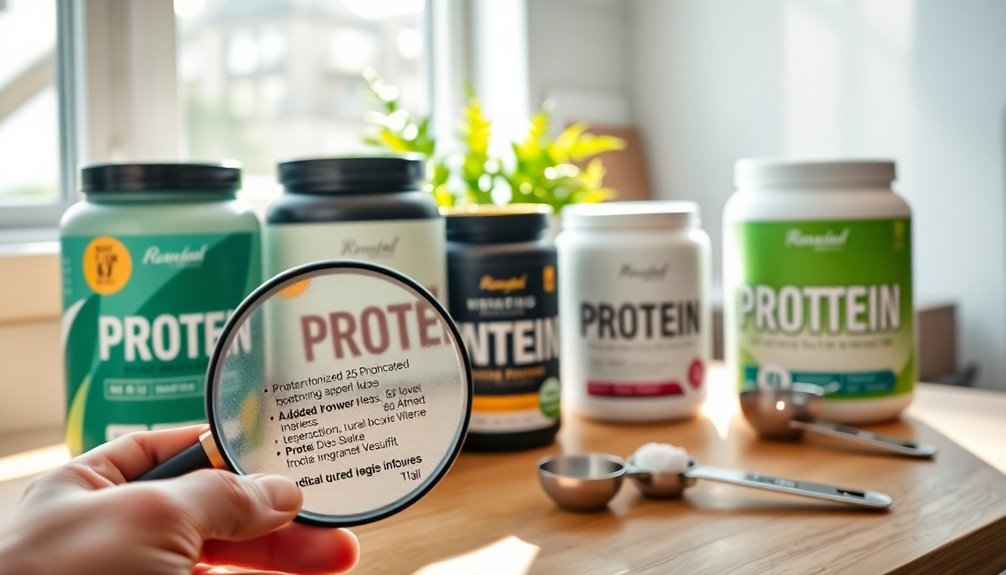
Many protein powders contain added ingredients that can greatly impact your weight loss journey. When selecting a protein powder, it's crucial to examine the label for these extras, as they can play an important role in your overall health and weight loss goals. Ingredients like sweeteners, fillers, and preservatives can't only add unnecessary calories but may also lead to digestive issues for some people.
For instance, many protein powders include artificial sweeteners that can cause bloating or discomfort. If you have a sensitive stomach, choosing a powder with minimal additives might be a smart choice.
Moreover, be cautious of allergen concerns. Ingredients such as soy, dairy, or gluten can trigger reactions for some individuals, making it essential to choose a product that aligns with your dietary needs.
In addition, some powders contain added vitamins or minerals, which may sound beneficial but could lead to nutrient imbalances if you're already getting enough from your diet. It's always a good idea to consult with a healthcare professional if you have any doubts.
Furthermore, selecting a protein powder with a clean ingredient list can enhance your overall health and support your weight loss goals, similar to how the Adaptive Body Boost program emphasizes using whole-food ingredients for optimal results.
Ultimately, selecting a protein powder with a clean ingredient list can help you feel more confident in your choices. By prioritizing whole-food ingredients and avoiding unnecessary additives, you'll create a strong foundation for your weight loss journey while ensuring that your body feels its optimal.
Importance of Flavor and Texture
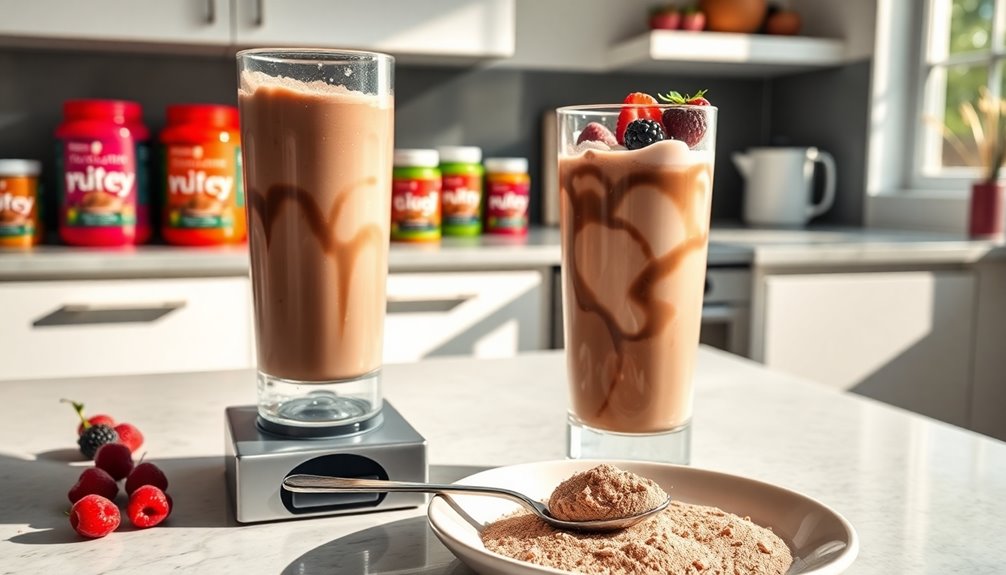
Flavor and texture often play an essential role in your protein powder experience, influencing how likely you're to stick with your weight loss plan. If you choose a protein powder that aligns with your personal taste preferences and texture preferences, you're more likely to enjoy your shakes and maintain your routine. Here are four key considerations to keep in mind:
- Variety of Flavors: Look for protein powders that offer multiple flavors. This variety can prevent boredom and make it easier to incorporate them into your daily meals.
- Taste Testing: Don't hesitate to sample different brands. Many companies offer single-serving packets, allowing you to find the flavor you love without committing to a full container.
- Smoothness vs. Grit: Consider your texture preferences. Some protein powders blend smoothly into shakes, while others can be gritty or grainy. A smoother texture can enhance your enjoyment and encourage you to stick with it.
- Mixability: Pay attention to how well the protein powder dissolves in liquids. A powder that mixes easily will make your meal prep quicker and more appealing.
In addition, choosing a protein powder that fits into your natural calorie cycles can help you maintain a balanced approach to weight loss without feeling deprived.
Timing Your Protein Intake
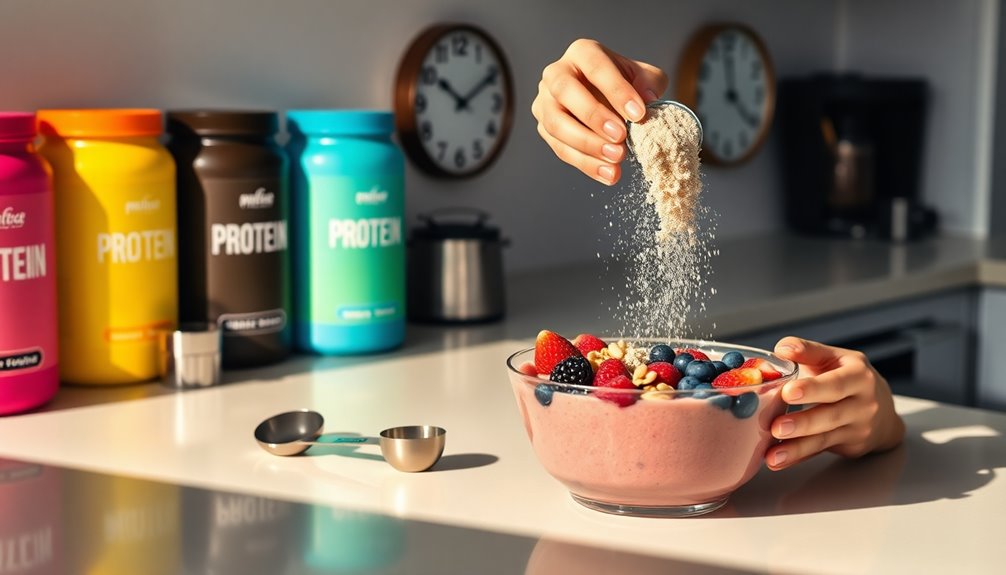
Enjoying your protein powder is just the beginning; how and when you consume it can greatly impact your weight loss journey. Timing your protein intake plays a pivotal role in maximizing its benefits.
One of the most effective times to consume protein is after your workout. Post workout consumption aids in muscle recovery and helps replenish energy stores. Research shows that having a protein shake within 30 minutes after exercising can notably enhance muscle protein synthesis, which is essential for weight loss and maintaining lean muscle mass.
On the flip side, consider your pre-sleep intake as well. While many people focus solely on their post-workout nutrition, having a protein-rich snack before bed can be equally advantageous. It helps curb late-night cravings and supports overnight muscle repair.
Casein protein, in particular, is slow-digesting, making it a great option if you're looking to sustain amino acid levels while you sleep. This can prevent muscle breakdown and keep your metabolism active during the night. Additionally, incorporating functional training into your routine can further enhance your overall results and support your weight loss goals.
Budgeting for Protein Powder
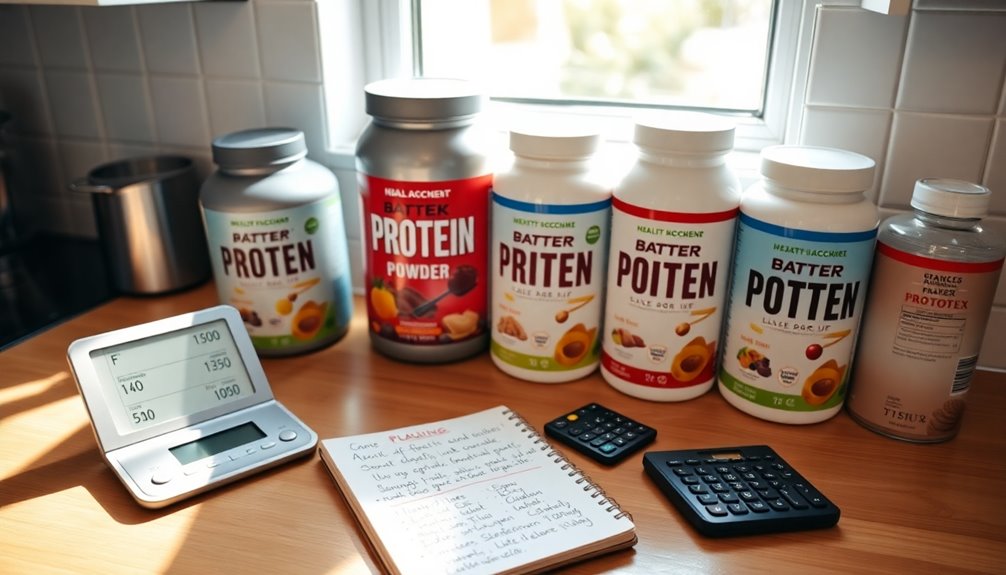
Exploring the world of protein powders can be overwhelming, especially when you're trying to stick to a budget. With so many options available, it's essential to conduct a thorough cost analysis before committing to a protein powder. You want to confirm you're getting the best value for your investment while still meeting your nutritional needs.
Here are some effective savings strategies to help you navigate your protein powder budget:
- Compare Prices: Don't settle for the first product you find. Check various retailers, both online and in-store, to find the best prices. Websites often have sales and discounts, so keep an eye out.
- Buy in Bulk: Purchasing larger quantities can lead to significant savings. Many brands offer discounts for bulk purchases, which can decrease your cost per serving.
- Look for Promotions: Sign up for newsletters or follow brands on social media. They often share exclusive promotions or discounts that can assist you in saving.
- Evaluate Serving Size: Before buying, check the serving size and the number of servings per container. Sometimes, a higher-priced product offers more servings, making it a better deal in the long run.
Additionally, consider the benefits of a diet program that includes protein powder, as it can enhance metabolism and promote weight loss, making your investment even more worthwhile.
Reading Product Labels
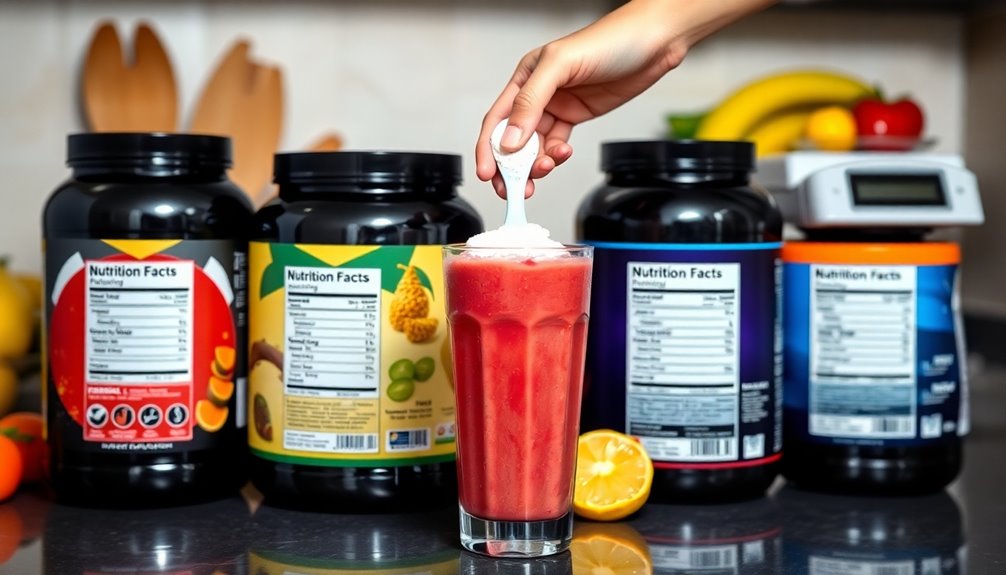
When choosing a protein powder for weight loss, understanding how to read product labels is essential. The nutritional information you find on these labels provides a wealth of knowledge that can help you make informed decisions. Start by checking the protein content per serving—aim for at least 20 grams of protein, as this can help you feel full and satisfied. Also, pay attention to the calorie count; you want a powder that fits into your daily caloric goals.
Next, look closely at the ingredient sourcing. Quality matters here. Check for natural ingredients and avoid powders with unnecessary fillers, artificial sweeteners, or preservatives. If you see "whey protein isolate" or "pea protein," you're on the right track, as these are usually high-quality sources. If you have dietary restrictions, make sure the powder aligns with your needs, whether it's vegan, gluten-free, or dairy-free.
Don't overlook the amino acid profile either. A complete protein, which contains all nine essential amino acids, is particularly beneficial for muscle repair and growth. Some labels even provide this breakdown, which can be a valuable tool in your selection process. Additionally, be aware that some protein powders may contain high glycemic values, which could negatively impact your weight loss efforts.
Seeking Professional Guidance
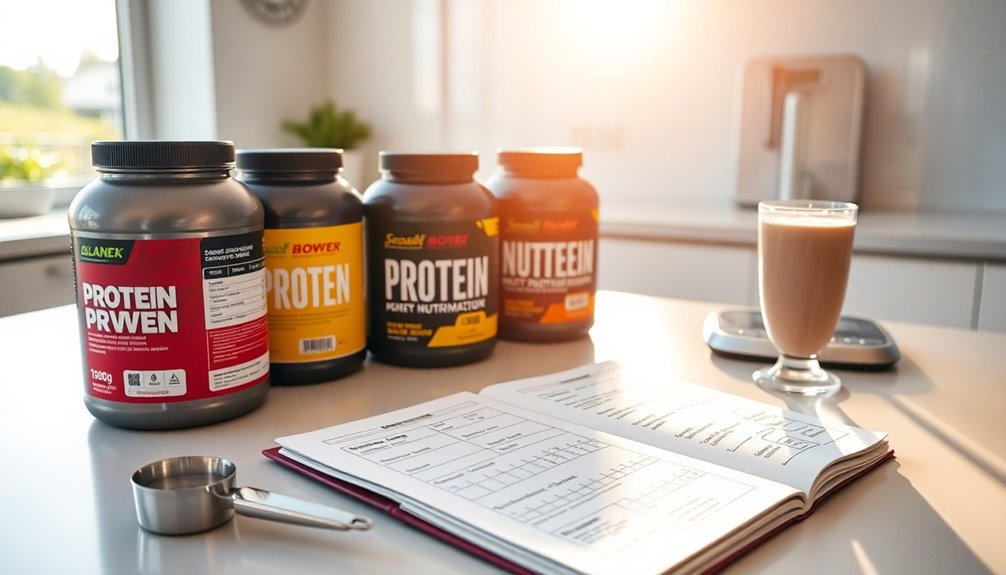
Exploring the world of protein powders can be overwhelming, and seeking professional guidance can make a significant difference in your weight loss journey. Engaging with a nutritionist or dietitian can provide you with expert recommendations tailored to your specific needs. This personalized approach guarantees you're choosing the right protein powder to support your goals effectively.
Here are some consultation benefits you can expect:
- Individualized Plans: A professional can create a customized nutrition plan that aligns with your weight loss objectives, taking into account your dietary preferences and restrictions.
- Protein Needs Assessment: They can help you determine how much protein you actually need based on your activity level and health goals, preventing you from over- or under-consuming.
- Product Selection: With their expertise, they can guide you through the myriad of options available, helping you choose a protein powder that fits your taste, budget, and nutritional requirements.
- Ongoing Support: Regular check-ins with a professional can keep you accountable and allow for adjustments to your plan as your weight loss journey progresses. Additionally, understanding how underlying health conditions affect your protein needs can enhance your overall dietary strategy.
Frequently Asked Questions
Can Protein Powder Replace Whole Food Sources of Protein?
Protein powder can't fully replace whole food sources of protein, but it offers effectiveness as a convenient supplement. While it's great for boosting your intake, whole foods provide essential nutrients and fiber that powders lack.
Consider protein powder alternatives like legumes, fish, or lean meats for a balanced diet. Combining both options helps you meet your protein needs while enjoying the variety that whole foods offer, creating a healthier lifestyle you can sustain.
How Much Protein Should I Consume Daily for Weight Loss?
For weight loss, your protein intake should typically be around 1.2 to 2.2 grams per kilogram of body weight, depending on your activity level. This range helps meet your daily requirements while supporting muscle retention and repair.
Aim for higher protein intake if you're active or strength training. Tracking your intake can make it easier to stay on target, helping you feel empowered and connected to your health journey.
Are There Any Side Effects of Taking Protein Powder?
Have you ever wondered what might happen if you overdo protein powder? While it can be beneficial, there are potential risks. Some people experience digestive issues, like bloating or gas, especially with certain types.
Long-term effects might include kidney strain if you consume excessive amounts. Listening to your body and consulting a healthcare professional are crucial in using protein powder safely and effectively, promoting a healthy lifestyle you can belong to.
Can I Use Protein Powder in Recipes?
Absolutely, you can use protein powder in recipes! Cooking with protein powder can enhance the nutritional value of your meals without compromising flavor. Whether you're baking with protein powder in muffins or adding it to smoothies, it blends well. Just remember to adjust other ingredients to maintain the right texture.
Experimenting with protein powder can help you create delicious, healthy dishes that fit your lifestyle, making it easier to reach your fitness goals.
Is It Safe to Use Protein Powder During Pregnancy?
Imagine nurturing a seedling with just the right amount of water; too much or too little can hinder its growth. Similarly, during pregnancy, meeting your nutritional needs safely is vital.
While protein powder can be helpful, consulting your healthcare provider first is necessary. They'll help guarantee you're making safe choices, as pregnancy safety is of utmost importance.
Conclusion
Choosing the right protein powder can be the difference between reaching your weight loss goals or feeling stuck. By balancing quality and caloric content, you can fuel your body effectively without unnecessary additives. While convenience often tempts you to grab the first option, taking the time to assess your dietary needs and read labels guarantees you're making an informed choice. Remember, investing in your health today pays off tomorrow, so make every scoop count.

